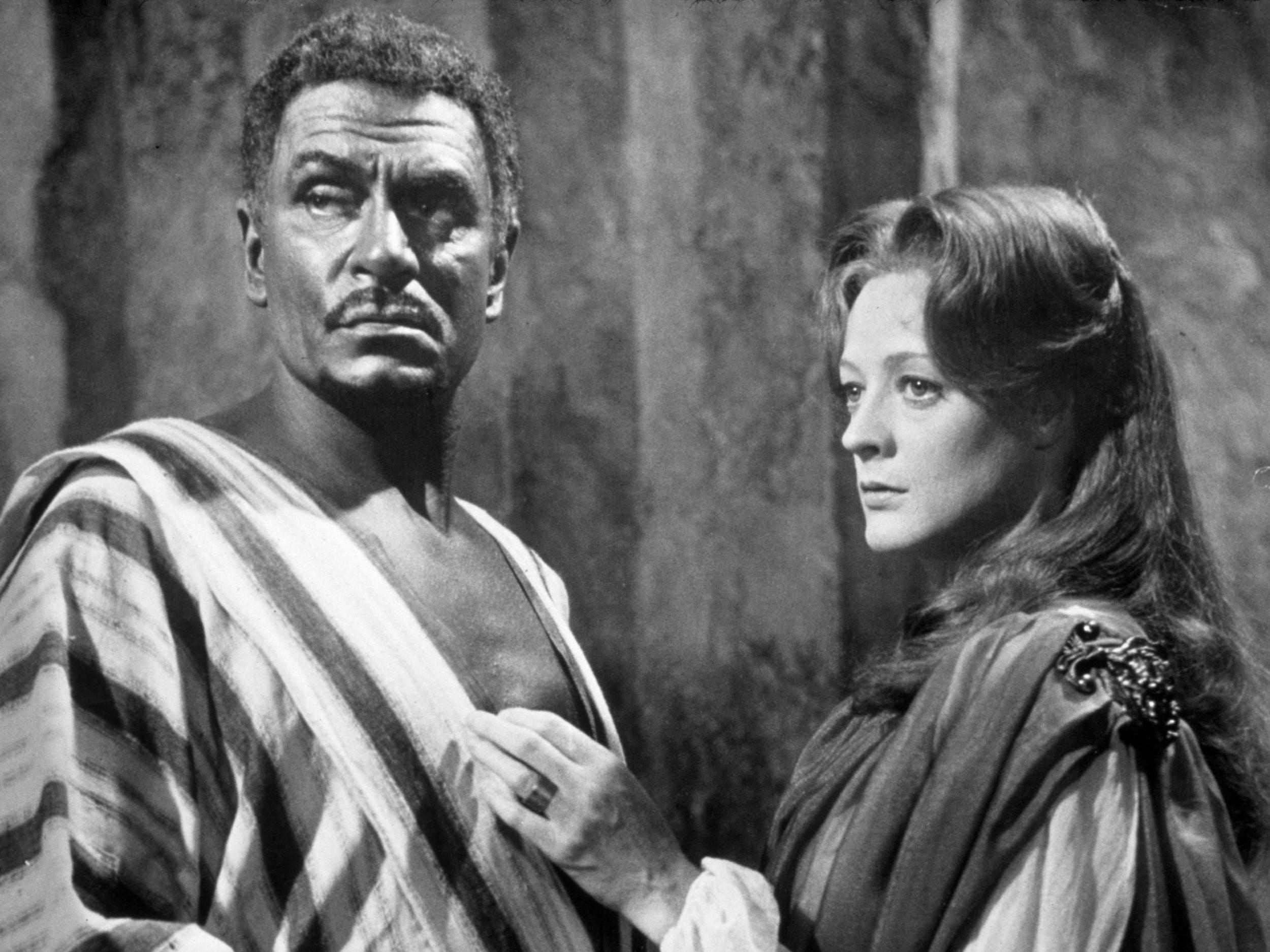Maggie Smith: A career of outstanding performances, from Othello to Downton Abbey
It has been 12 years since the dame last appeared on stage – but now she’s back with ‘A German Life’, a one-woman play about Goebbels secretary Brunhilde Pomsel. Paul Taylor charts the actor’s great achievements

They say that adult actors should never work with children or animals. The wisdom of this statement is not watertight. In fact, it can be roundly questioned in just six words: Dame Maggie Smith and the pig. The porker in question was her co-star – alongside Michael Palin – in the movie A Private Function (1984), directed by Malcolm Mowbray and with a script hilariously tailored to her talents by Alan Bennett.
Running through the list of great actresses, you can come up with a fair few who would be amusing to watch in the film’s ingeniously excruciating situation. House-proud, friendless, socially insecure wife of a routinely slighted chiropodist, Joyce winds up having to share her erstwhile spotless facilities with a black-market pig that has become extravagantly incontinent as a result of being fattened up with rubbish for a royal wedding party to which the chiropodist couple haven’t even been invited. The pig is duly sacrificed.
You can insert many an English actress into such a scenario and rely on the result being satisfactory. But Smith delivers a performance that is brilliantly funny, flecked with unforced pathos, and which – in a career of outstanding performances – remain, for this viewer, a matchless monument: comedy and near-miss tragedy flung at each other with such finesse that they become indissoluble, in a slightly dissolute way. Smith is the platonic ideal for the part because she is the total master at capturing something essential about English society – that it has been arranged so that there is no vantage point from which you can’t be looked down on. And that one person’s common is another person’s classy. Below-the-salt is a roomy and treacherous space where snobbery doesn’t recognise distinctions.
Born in 1934, Smith was 50 years old when this was film was made. I single it out in this way because it exemplifies what her whole vocal and bodily instruments might have been born to register; the fraught fluctuations within class-consciousness. Already behind her was her glorious contribution to the fledgling National Theatre. She’d played a doughtier-than-usual Desdemona to the electric flagrancy of Laurence Olivier’s Othello, and as Hilde Wangel in Ibsen’s play, she had arrived at the door of Olivier’s master builder creating the kind of hormonal upset and existential crisis that is liable to happen when irresponsible youth comes nose to nose with the male menopause. (The two actors were competitive, which is how he liked it.)

She and Robert Stephens (who became her husband) then occupied that special status in British showbiz that gets starry married twosomes compared to the Lunts or Liz and Dick. Stephens, a master at seeping with dark-stained failure and self-disgust, went on to be a memorable King Lear – who resembled a late self-portrait by Rembrandt – for the RSC at Stratford in 1994. It’s such a pity that there wasn’t back then the freedom there is now for women to play men. Smith and Stephens would have been a combusting pairing as the stormy monarch and a solicitously snide and watchfully camp Fool.
She has, of course, stunningly channelled Shakespeare’s Lear, in the not-so-oblique shape of her sublime portrayal of the vagrant, Miss Shepherd, in Alan Bennett’s The Lady in the Van, directed on stage and screen by Nicholas Hytner with an uncanny feel for what it tells us about English society. Both the film (which is better than the play) and the great central performance are unwaveringly alive to what its real subject is; poverty and what that irredeemably deprives people of. Its epigraph could be King Lear’s sudden agonised realisation of what he has let slide while in the thrombosis of emotional tyranny: “O I have ta’en too little care of this...”

It’s 12 years since the dame appeared on stage in Edward Albee’s The Lady from Dubuque. On Friday, in what would be an understatement to describe as a coup for theatre in Britain and in general, she will be the focus of all eyes again in A German Life – a one-woman play about Brunhilde Pomsel who died in 2017 at 106, having been the secretary of Joseph Goebbels, Hitler’s propaganda minister. One of the oldest surviving witnesses of the internal workings of Nazi power, Pomsel described herself as an “apolitical girl”.
Smith has always excelled at giving glimpses of the ardent, larger-souled woman that her character might have been if circumstance hadn’t wedged her in pettiness. Miss Shepherd is her richest performance to date – Lear’s dogmatic cantankerousness pursued by Miss Shepherd’s trademark mouse-tail of uncertainty: “Blow winds, and crack your cheeks”, possibly. It’s heady that she might top that achievement tonight in Jonathan Kent’s production in Hytner’s own theatre, the Bridge.
Smith is renowned for not suffering fools gladly. When a waitress asked her about the kind of water she required in a New York restaurant, she is said to have snapped: “The sort you pour down your throat.” One eminent director says he would call her a friend but would not like to know what she really thinks about him. From what I can gather talking to these off-the-record intimates, you would be unlikely to hear the following words fall from her lips: herstory; humanitarian; Hogwarts. Just kidding about the last of these. She appears to prefer Hogwarts to Downton Abbey by a country mile. “She despises, detests, loathes and abominates Downton Abbey,” reports one chum, “and deeply resents that it’s that programme that brought her fame and fortune”.
But everyone is, quite rightly, being generous about her. The producer Robert Fox, who has presented more of her stage shows than anyone, says: “I have been lucky to work with people of outstanding talent but I can genuinely say that she is the greatest of them all. I am thrilled she has decided to do another play and I can’t wait to see it. I’m just jealous that I’m not producing it.” It’s bracing to think of Bridge Theatre audiences preparing to give it up once again for Dame Maggie Smith.
A German Life is at the Bridge Theatre from 12 April until 11 May; 0333 320 0052
Join our commenting forum
Join thought-provoking conversations, follow other Independent readers and see their replies
Comments
Bookmark popover
Removed from bookmarks